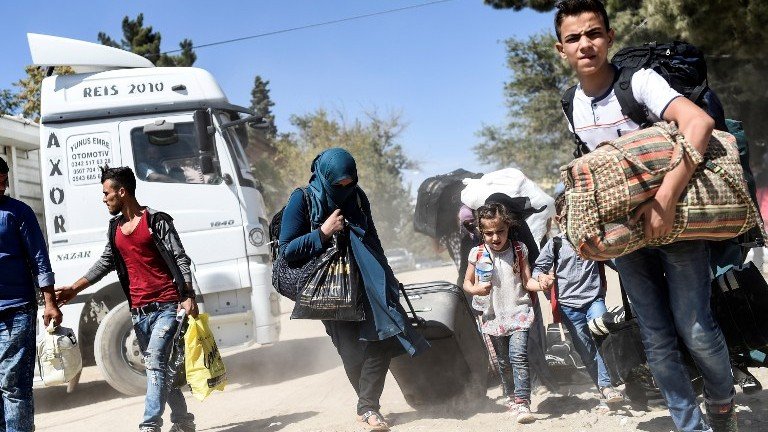

Baku TurkicWorld
Home to one the world’s largest refugee populations, Türkiye has in recent years stepped up its efforts for the safe return of Syrians willing to go back home, not just to the border area but across the rest of the country that has been battered by a civil war since 2011, TurkicWorld reports citing Daily Sabah.
Some 3.7 million people fled persecution and brutality in Syria for asylum in Türkiye after President Bashar Assad’s regime cracked down on pro-democracy protests with unexpected ferocity, giving rise to a decade of fighting that left over half a million Syrians dead and a staggering 15.3 million people in need of humanitarian aid.
The war marked a turning point in relatively warm ties with Türkiye’s neighbor as Ankara backed opposition fighters wanting to oust Assad and welcomed a surge of refugees.
While fighting has mostly subsided, Syria remains divided between Assad and opposition forces, which have withdrawn into the northwest after Assad’s troops reclaimed two-thirds of the country, as well as terror groups like the PKK, its U.S.-backed local affiliate, the YPG, and remnants of Daesh in the northeast, making it impossible for Assad to establish territorial integrity.
Besides creating a safe zone for Syrians, Türkiye’s other concern has been repelling the PKK/YPG, whose bloody insurgency over its separatist agenda has left over 40,000 people dead in Türkiye since the 1980s and countless others in northern regions of Syria and Iraq where they have been coordinating their attacks from a network of bases.
To eliminate the formation of a terror corridor along its Syrian border and enable the peaceful resettlement of residents, Ankara has been striking these terrorist targets with cross-border operations since 2016, often stressing the preservation of Syria’s territorial integrity as a “top priority.”
In addition to recent talks with Damascus encouraged by Russia and Iran to normalize Turkish-Syrian ties, Türkiye is also a vocal backer of the U.N. Security Council resolution calling for a political solution to the Syrian crisis.
Assad’s insistence on ignoring the political method, however, still poses a major problem for the return of his citizens.
This week, the U.N.’s envoy to Syria said some Syrians intended to return within the next year due to a lack of job opportunities and other reasons, including safety.
“Most Syrian refugees still hope to return one day, and the sizable number hope to return within five years,” Geir Pedersen said during a briefing to the UNSC. He cited a newly published annual survey with 1.9 million Syrian refugees in Jordan, Lebanon, Iraq and Egypt by the U.N. refugee agency, UNHCR. “Only a small fraction indicated their intention to return in the next 12 months.”
According to the survey, lack of livelihood and inadequate essential services, military service, border recruitment, fear of arrest, detention, harassment and retaliation are among the top reasons for not returning.
“We continue to uphold and further the principle of safe, dignified and momentarily refugee returns,” said Pedersen.
“It is vital that the recent diplomatic moves are met with real action,” he said. “While they have observed recent diplomatic developments, they have not yet seen any improvement in the reality of their lives, whether inside Syria or outside Syria.”
In the meantime, Ankara has been further striving to improve daily lives and provide new roads, schools, hospitals, organized industrial sites and better infrastructure for the northern regions now effectively cleared of terror elements.
Over 6 million Syrians now live in nearly 107,000 briquette homes Türkiye has erected in the Afrin district of opposition-held Idlib, but the camps are overcrowded by 2.5 million people and quadrilateral negotiations with Assad’s regime will aim to ensure that people from Aleppo, Damascus and southern provinces can return to their homes.
Through “voluntary return bureaus” set up in 12 Turkish provinces with high refugee populations, refugees can cross the border under the principle of “safe, voluntary and dignified return,” as the Migration Management Directorate of the Interior Ministry said.
So far, some 554,000 Syrians have permanently returned and over 6 million Syrians now live in nearly 107,000 briquette homes Türkiye has erected in the Afrin district.
Most recently, Türkiye unveiled a "Voluntary, Safe, Honorable Return Project" in Syria’s Jarablus city with Qatari funding to guarantee the repatriation of at least 1 million Syrian refugees over the next three years.
President Recep Tayyip Erdoğan often underscores the importance of adopting a “humane, conscientious and Islamic” aspect to the repatriation efforts, that Türkiye cannot send back Syrians “by using force.”
His approach has been contrary to his political opposition that wielded harsh rhetoric, insistently calling to expel millions of refugees, including Syrians and Afghans, from Türkiye as they sought nationalist votes for May 14’s presidential and parliamentary elections.
In the months leading to the vote, which resulted in Erdoğan’s re-election, the ultra-nationalist opposition’s calls have sent anti-migrant sentiment soaring in Türkiye amid economic turmoil and high inflation.
Rampant misinformation and hate speech on social media platforms, especially by opposition supporters, have fueled xenophobia and violence toward Syrian refugees.